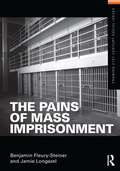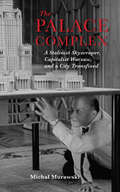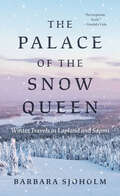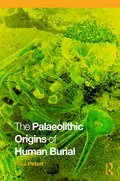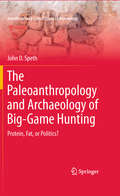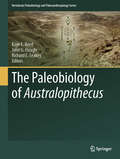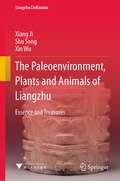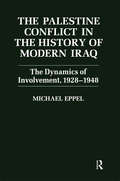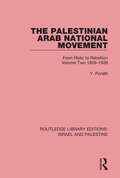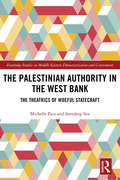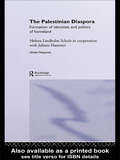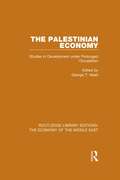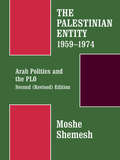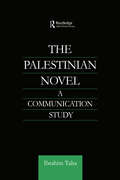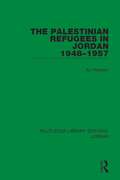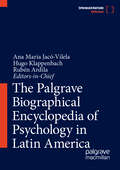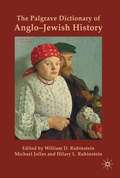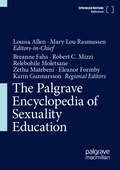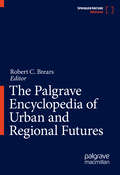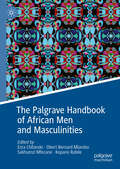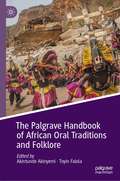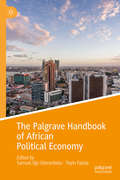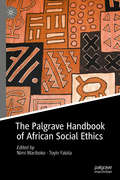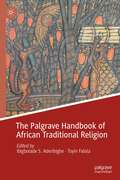- Table View
- List View
The Pains of Mass Imprisonment (Framing 21st Century Social Issues)
by Benjamin Fleury-Steiner Jamie G LongazelThis concise and engaging book presents a critical perspective on the correctional system and the process of incarceration in the United States. Fleury-Steiner and Longazel emphasize the magnitude of mass imprisonment in the United States, especially of people of color, not by objective statistics and trends, but by the voices and lived experiences of individuals who live their harsh conditions on a daily basis. This is an ideal book for courses in corrections, social problems, criminology, and prisoner re-entry.
The Painted Screens of Baltimore: An Urban Folk Art Revealed (Folklore Studies in a Multicultural World Series)
by Elaine EffPainted screens have long been synonymous in the popular imagination with the Baltimore row house. Picturesque, practical, and quirky, window and door screens adorned with scenic views simultaneously offer privacy and ventilation in crowded neighborhoods. As an urban folk art, painted screens flourished in Baltimore, though they did not originate there--precursors date to early eighteenth-century London. They were a fixture on fine homes and businesses in Europe and America throughout the Victorian era. But as the handmade screen yielded to industrial production, the whimsical artifact of the elite classes was suddenly transformed into an item for mass consumption. Historic examples are now a rarity, but in Baltimore the folk art is still very much alive.The Painted Screens of Baltimore takes a first look at this beloved icon of one major American city through the words and images of dozens of self-taught artists who trace their creations to the capable and unlikely brush of one Bohemian immigrant, William Oktavec. In 1913, this corner grocer began a family dynasty inspired generations of artists who continue his craft to this day. The book examines the roots of painted wire cloth, the ethnic communities where painted screens have been at home for a century, and the future of this art form.
The Palace Complex: A Stalinist Skyscraper, Capitalist Warsaw, and a City Transfixed (New Anthropologies of Europe)
by Michal MurawskiAn exploration of the history and significance of the Palace of Culture and Science in Warsaw, Poland.The Palace of Culture and Science is a massive Stalinist skyscraper that was “gifted” to Warsaw by the Soviet Union in 1955. Framing the Palace’s visual, symbolic, and functional prominence in the everyday life of the Polish capital as a sort of obsession, locals joke that their city suffers from a “Palace of Culture complex.” Despite attempts to privatize it, the Palace remains municipally owned, and continues to play host to a variety of public institutions and services. The Parade Square, which surrounds the building, has resisted attempts to convert it into a money-making commercial center. Author Michal Murawski traces the skyscraper’s powerful impact on twenty-first century Warsaw; on its architectural and urban landscape; on its political, ideological, and cultural lives; and on the bodies and minds of its inhabitants. The Palace Complex explores the many factors that allow Warsaw’s Palace to endure as a still-socialist building in a post-socialist city.“The most brilliant book on a building in many years, making a case for Warsaw’s once-loathed Palace of Culture and Science as the most enduring and successful legacy of Polish state socialism.” —Owen Hatherley, The New Statesman’s“Books of the Year” list (UK)“An ambitious anthropological biography of Poland’s tallest and most infamous building, the Palace of Culture and Science in Warsaw. . . . It is a truly fascinating story that challenges a tenacious stereotype, and Murawski tells it brilliantly, judiciously layering literatures from multiple disciplines, his own ethnographic work, and personal anecdotes.” —Patryk Babiracki, H-Net History
The Palace of the Snow Queen: Winter Travels in Lapland and Sápmi
by Barbara SjoholmAn exploration of the winter wonders and entangled histories of Scandinavia&’s northernmost landscapes—now back in print with a new afterword by the author After many years of travel in the Nordic countries—usually preferring to visit during the warmer months—Barbara Sjoholm found herself drawn to Lapland and Sápmi one winter just as mørketid, the dark time, set in. What ensued was a wide-ranging journey that eventually spanned three winters, captivatingly recounted in The Palace of the Snow Queen. From observing the annual construction of the Icehotel in Jukkasjärvi, Sweden, to crossing the storied Finnmark Plateau in Norway, to attending a Sámi film festival in Finland, Sjoholm dives deep into the rich traditions and vibrant creative communities of the North. She writes of past travelers to Lapland and contemporary tourists in Sápmi, as well as of her encounters with Indigenous reindeer herders, activists, and change-makers. Her new afterword bears witness to the perseverance of the Sámi in the face of tourism, development, and climate change. Written with keen insight and humor, The Palace of the Snow Queen is a vivid account of Sjoholm&’s adventures and a timely investigation of how ice and snow shape our imaginations and create a vision that continues to draw visitors to the North.
The Palaeolithic Origins of Human Burial
by Paul PettittHumans are unique in that they expend considerable effort and ingenuity in disposing of the dead. Some of the recognisable ways we do this are visible in the Palaeolithic archaeology of the Ice Age. The Palaeolithic Origins of Human Burial takes a novel approach to the long-term development of human mortuary activity – the various ways we deal with the dead and with dead bodies. It is the first comprehensive survey of Palaeolithic mortuary activity in the English language. Observations in the modern world as to how chimpanzees behave towards their dead allow us to identify ‘core’ areas of behaviour towards the dead that probably have very deep evolutionary antiquity. From that point, the palaeontological and archaeological records of the Pliocene and Pleistocene are surveyed. The core chapters of the book survey the mortuary activities of early hominins, archaic members of the genus Homo, early Homo sapiens, the Neanderthals, the Early and Mid Upper Palaeolithic, and the Late Upper Palaeolithic world. Burial is a striking component of Palaeolithic mortuary activity, although existing examples are odd and this probably does not reflect what modern societies believe burial to be, and modern ways of thinking of the dead probably arose only at the very end of the Pleistocene. When did symbolic aspects of mortuary ritual evolve? When did the dead themselves become symbols? In discussing such questions, The Palaeolithic Origins of Human Burial offers an engaging contribution to the debate on modern human origins. It is illustrated throughout, includes up-to-date examples from the Lower to Late Upper Palaeolithic, including information hitherto unpublished.
The Paleoanthropology and Archaeology of Big-Game Hunting
by John D. SpethSince its inception, paleoanthropology has been closely wedded to the idea that big-game hunting by our hominin ancestors arose, first and foremost, as a means for acquiring energy and vital nutrients. This assumption has rarely been questioned, and seems intuitively obvious--meat is a nutrient-rich food with the ideal array of amino acids, and big animals provide meat in large, convenient packages. Through new research, the author of this volume provides a strong argument that the primary goals of big-game hunting were actually social and political--increasing hunter's prestige and standing--and that the nutritional component was just an added bonus. Through a comprehensive, interdisciplinary research approach, the author examines the historical and current perceptions of protein as an important nutrient source, the biological impact of a high-protein diet and the evidence of this in the archaeological record, and provides a compelling reexamination of this long-held conclusion. This volume will be of interest to researchers in Archaeology, Evolutionary Biology, and Paleoanthropology, particularly those studying diet and nutrition.
The Paleobiology of Australopithecus
by Richard E. Leakey Kaye E. Reed John G. FleagleAustralopithecus species have been the topic of much debate in palaeoanthropology since Raymond Dart described the first species, Australopithecus africanus, in 1925. This volume synthesizes the geological and paleontological context of the species in East and South Africa; covers individual sites, such as Dikika, Hadar, Sterkfontein, and Malapa; debates the alpha taxonomy of some of the species; and addresses questions regarding the movements of the species across the continent. Additional chapters discuss the genus in terms of sexual dimorphism, diet reconstruction using microwear and isotopic methodologies, postural and locomotor behavior, and ontogeny.
The Paleoenvironment, Plants and Animals of Liangzhu: Essence and Treasures (Liangzhu Civilization)
by Xin Wu Xiang Ji Shu SongThis book summarizes the latest archeological findings on Liangzhu culture and outlines the rise and fall of Liangzhu society in terms of its environment, flora and fauna. In addition, it seeks to analyze the characteristics of animal breeding and agricultural cultivation in Liangzhu from the perspectives of archeobotany and archeozoology. In turn, it explores the dietary structure and population density, reaching the bold conclusion that the dramatic increase in population gave rise to environmental deterioration and to natural disasters that eventually destroyed the Liangzhu culture.
The Palestine Conflict in the History of Modern Iraq: The Dynamics of Involvement 1928-1948
by Michael EppelThe Palestine conflict constitutes one of the most prolonged and complex disputes of the twentieth century. It has consistently dominated Arab-Jewish relations and has in turn been affected by social, political and ideological tensions and struggles within the Arab states as well as within Israel. This book describes the influence and the functions of the Palestine conflict in the history of a modernizing Arab state.
The Palestinian Arab National Movement, 1929-1939: From Riots to Rebellion
by Yehoshua PorathThis book, first published in 1977, continues the author’s of the Palestinian National Movement from the first volume, The Emergence of the Palestinian-Arab National Movement, 1918-1929. It examines in exhaustive detail the events in the crucial decade leading up to the Second World War.
The Palestinian Authority in the West Bank: The Theatrics of Woeful Statecraft (Routledge Studies in Middle Eastern Democratization and Government)
by Michelle Pace Somdeep SenThe Palestinian Authority in the West Bank explores the manner in which the Palestinian Authority’s performative acts affect and shape the lives and subjective identities of those in its vicinity in the occupied West Bank. The nature of Palestinians’ statelessness has to contend with the rituals of statecraft that the Palestinian Authority (PA) and its Palestinian functionaries engage in. These rituals are also economically maintained by an international donor community and are vehemently challenged by Palestinian activists, antagonistic to the prevalence of the statist agenda in Palestine. Conceptually, the understanding of the PA’s ‘theater of statecraft’ is inspired by Judith Butler’s conception of performativity as one that encompasses several repetitive and ritual performative acts. The authors explore what they refer to as the ‘fuzzy state' (personified in the form and conduct of the PA) looks like for those living it, from the vantage point of PA institutions, NGOs, international representative offices, and activists. Methodologically, the book adopts an ethnographic approach, by way of interviews and observations in the occupied West Bank and East Jerusalem. The Palestinian Authority in the West Bank makes an important and long-due intervention by integrating performance studies and politics to suggest an understanding of the theatrics of woeful statecraft in Palestine. The book is an essential resource for students and scholars interested in the study of the state, International Relations and Politics, Palestine Studies, and the Middle East.
The Palestinian Diaspora (Global Diasporas)
by Helena Lindholm SchulzFrom the refugee camps of the Lebanon to the relative prosperity of life in the USA, the Palestinian diaspora has been dispersed across the world. In this pioneering study, Helena Lindholm Schulz examines the ways in which Palestinian identity has been formed in the diaspora through constant longing for a homeland lost. In so doing, the author advances the debate on the relationship between diaspora and the creation of national identity as well as on nationalist politics tied to a particular territory. But The Palestinian Diaspora also sheds light on the possibilities opened up by a transnational existence, the possibility of new, less territorialized identities, even in a diaspora as bound to the idea of an idealized homeland as the Palestinian. Members of the diaspora form new lives in new settings and the idea of homeland becomes one important, but not the only, source of identity. Ultimately though, Schulz argues, the strong attachment to Palestine makes the diaspora crucial in any understandings of how to formulate a viable strategy for peace between Israelis and Palestinians.
The Palestinian Economy: Studies in Development under Prolonged Occupation (Routledge Library Editions: The Economy of the Middle East)
by George T. AbedThis volume brings together the results of the symposium on ‘Economic Development under Prolonged Occupation’ held at Oxford University in January 1986. The basic aim of the symposium was to stimulate research and discussion on issues of economic development by a prolonged occupation. It brought together a number of development economists, representatives from development assistance organisations and other individuals engaged in one facet or another of social and economic development in the occupied areas. The papers presented here reflect the wide range of thought on the issues surrounding the Palestinian Economy.
The Palestinian Entity 1959-1974: Arab Politics and the PLO
by Moshe ShemeshThis book traces the development of the Palestinian national movement, especially in the West Bank and Gaza Strip, between 1968 and 1974 under the leadership of the Fatah which has become the PLO's backbone.
The Palestinian Novel: A Communication Study (Routledge Studies in Middle Eastern Literatures)
by Ibrahim TahaExamines the complex relationship between the reality of the Palestinian minority in Israel and their literature through six novels, according to a literary communication model which enables Dr Taha to examine how authors who belong to this minority relate to their readers.
The Palestinian Refugees in Jordan 1948-1957 (Routledge Library Editions: Jordan #3)
by Avi PlascovThere is perhaps no aspect of the Arab-Israeli conflict that is more complex and more emotionally charged than the problem of the Palestinian refugees. The atmosphere surrounding the discussion has led to confusion, so that the facts have become unclear and the problems more difficult to treat. This book, first published in 1981, examines the complex interlocking issues that surround the topic of the Palestinian refugees in the country that adopted most of them – Jordan.
The Palgrave Biographical Encyclopedia of Psychology in Latin America
by Rubén Ardila Ana Maria Jacó-Vilela Hugo KlappenbachThis biographical encyclopedia will provide the first comprehensive reference work on leading scholars and professionals who have contributed to the development and institutionalization of psychology in Latin America. The figures biographed will include scholars who have made a significant theoretical contribution to the discipline, as well as, practitioners and those who have contributed to the institutionalization of psychology, through their work in scientific organisations, professional bodies and publications. All persons included are recognized authorities and either natives of, or long-term residents in the region. It will offer an invaluable reference point, in particular for scholars of the history of psychology, Latin American studies, the history of science, and global psychology; as well as for historians, psychologists and social scientists seeking international perspectives on the development of the discipline.
The Palgrave Dictionary of Anglo-Jewish History
by William D. RubinsteinThis authoritative and comprehensive guide to key people and events in Anglo-Jewish history stretches from Cromwell's re-admittance of the Jews in 1656 to the present day and contains nearly 3000 entries, the vast majority of which are not featured in any other sources.
The Palgrave Encyclopedia of Sexuality Education
by Louisa Allen Mary Lou RasmussenThis Encyclopedia provides a comprehensive map of the field of sexuality education. It offers an entry point for those interested in this topic, providing a robust summary of issues and directing them to its best scholarship. Comprehensive in scope, it covers diverse global locations to highlight the significance of context when defining sexuality education. The rapid development and increase in accessibility of digital technologies, which has broadened sexuality education to include digital and media platforms, is also reflected.
The Palgrave Encyclopedia of Urban and Regional Futures
by Robert C. BrearsThis encyclopaedia will be an indispensable resource and recourse for all who are thinking about cities and the urban, and the relation of cities to literature, and to ways of writing about cities. Covering a vast terrain, this work will include entries on theorists, individual writers, individual cities, countries, cities in relation to the arts, film and music, urban space, pre/early and modern cities, concepts and movements and definitions amongst others. Written by an international team of contributors, this will be the first resource of its kind to pull together such a comprehensive overview of the field.
The Palgrave Handbook of African Men and Masculinities
by Ezra Chitando Kopano Ratele Obert Bernard Mlambo Sakhumzi MfecaneThis handbook provides a comprehensive, interdisciplinary overview of key theoretical and analytical approaches, topics and debates in contemporary scholarship on African masculinities. Refusing to privilege Western theoretical constructs (but remaining in dialogue with them), contributors explore the contestations around and diversities within men, masculinities and sexualities in Africa; investigate individual and collective practices of masculinity; and interrogate the social construction of masculinities. Bringing together insights from scholars across gender studies, sociology, anthropology, philosophy, history, literature and religion, this book demonstrates how recognizing and upholding the integrity of African phenomena, locating and reflecting on men and masculinities in varied African contexts and drawing new theoretical frameworks all combine to take the discourse on men and masculinities in Africa forward. Chapters examine a range of issues within the context ofmasculinities, including embodiment, sport, violence, militarism, spirituality, gender roles, fatherhood, homosexuality, health and work. This handbook will be valuable reading for scholars, researchers, and policymakers in Masculinity Studies, and more broadly Gender Studies, as well as Africana Studies.
The Palgrave Handbook of African Oral Traditions and Folklore
by Toyin Falola Akintunde AkinyemiThis handbook offers the most comprehensive, analytic, and multidisciplinary study of oral traditions and folklore in Africa and the African Diaspora to date. Preeminent scholars Akintunde Akinyemi and Toyin Falola assemble a team of leading and rising stars across African Studies research to retrieve and renew the scholarship of oral traditions and folklore in Africa and the Diaspora just as critical concerns about their survival are pushed to the forefront of the field. With five sections on the central themes within orality and folklore – including engagement ranging from popular culture to technology, methods to pedagogy – this handbook is an indispensable resource to scholars, students, and practitioners of oral traditions and folklore preservation alike. This definitive reference is the first to provide detailed, systematic discussion, and up-to-date analysis of African oral traditions and folklore.
The Palgrave Handbook of African Political Economy (Palgrave Handbooks in IPE)
by Toyin Falola Samuel Ojo OloruntobaThis handbook constitutes a specialist single compendium that analyses African political economy in its theoretical, historical and policy dimensions. It emphasizes the uniqueness of African political economy within a global capitalist system that is ever changing and complex. Chapters in the book discuss how domestic and international political economic forces have shaped and continue to shape development outcomes on the continent. Contributors also provoke new thinking on theories and policies to better position the continent’s economy to be a critical global force. The uniqueness of the handbook lies in linking theory and praxis with the past, future, and various dimensions of the political economy of Africa.
The Palgrave Handbook of African Social Ethics
by Toyin Falola Nimi WaribokoThis Handbook provides a robust collection of vibrant discourses on African social ethics and ethical practices. It focuses on how the ethical thoughts of Africans are forged within the context of everyday life, and how in turn ethical and philosophical thoughts inform day-to-day living. The essays frame ethics as a historical phenomenon best examined as a historical movement, the dynamic ethos of a people, rather than as a theoretical construct. It thereby offers a bold, incisive, and fresh interpretation of Africa’s ethical life and thought.
The Palgrave Handbook of African Traditional Religion
by Toyin Falola Ibigbolade S. AderibigbeThe Palgrave Handbook of African Traditional Religion interrogates and presents robust and comprehensive contributions from interdisciplinary experts and scholars. Offering a range of perspectives and opinions through the prism of understanding the past about African Traditional religions and, more importantly, capturing their dynamics in the present and projecting their sustainability and relevance for the future, this volume is an essential resource for knowledge and understanding of African Traditional religions in the global space of religious traditions.
